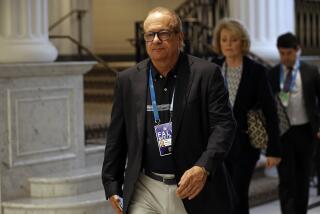Chrysler heir shifts from idle to fully engaged in carmaker
- Share via
CHESTERTOWN, MD. -- — Past Todd’s Body Shop and a crab shack, across from a field of wheat on Route 291, hangs a modest sign for Frank B. Rhodes Jr., furniture maker since 1983.
Enter the metal warehouse he uses for his office, showroom and woodworking shop, and there’s nothing to let visitors know that the Eastern Shore 50-year-old is one of the few remaining heirs of Walter P. Chrysler, the founder of the auto company that is now struggling to survive.
But around the corner from the showroom’s racks of flowered and paisley fabric swatches, one finds what essentially amounts to a mini museum to Chrysler.
For the last 20-plus years, Rhodes -- who is the great-grandson of Chrysler -- has kept the family’s archives and added to the collection.
The memorabilia ranges from an old metal clock with the inscription “Use Chrysler Corp. Parts Division Products” to three cupboards stacked with books, movies and letters related to the company.
There are walls decorated with black-and-white pictures of Chrysler’s founding father -- one, taken in 1936, shows him standing behind a row of dead geese he hunted with a friend in Cambridge, Md.
For years, Rhodes rarely mentioned his connections to the Chrysler family, and few in town even knew, save for a few close friends.
But over the last six months, Rhodes has launched what amounts to a one-man public relations campaign to try to save the auto company his great-grandfather founded in 1925.
With help from his bookkeeper, he has sent hundreds of letters to most anyone who would listen -- and even those who wouldn’t -- including the president; every member of Congress; Chrysler Chief Executive Robert Nardelli; Steven Rattner, the head of President Obama’s auto task force; former Treasury Secretary Henry M. Paulson Jr.; and Ron Gettelfinger, the president of the United Auto Workers.
He has volleyed e-mails with bloggers who are against a bailout of the auto industry and debated Internet talk-show hosts.
His missives seek information on a person’s position and attempt to cajole critics and rally allies: “Mr. President,” he wrote Obama in April, “I know with due diligence the auto task force will use every tool necessary to make this work for Chrysler and more importantly our country.”
The president has yet to respond to the letter. But Nardelli wrote back in January to assure him that “the entire Chrysler team is working tirelessly to do everything we can to preserve the wonderful heritage of your great-grandfather.”
Nardelli added: “I also want to thank you for your recent purchase of a Dodge Caliber on December 10th for your daughter, which speaks volumes of your confidence and support in Chrysler LLC.”
Rhodes keeps a voice mail from the mayor of Lansing, Mich., thanking him and encouraging him to keep up the fight.
His biggest motivation in his fight to save Chrysler is his grandmother, Bernice Chrysler.
In 1979, when Chrysler was on the verge of bankruptcy and a few months before she died, Rhodes said, his grandmother asked him to “please do what you can to keep the engine running.”
“She told me that, and I guess it has stuck with me,” Rhodes said. “This would hurt her so bad.”
Rhodes, an energetic former lacrosse player and a history major, recently went to Capitol Hill and sat through two days of Nardelli’s testimony.
He also spoke to a group of several hundred union auto workers at a rally in Baltimore, even though he admits that public speaking is not his strong suit.
Indeed, a conversation with him can veer suddenly from the intricacies of an antique dining room chair to the “cool” design of Chrysler’s Viper.
Rhodes said that neither he nor his wife, Susan, owns any Chrysler stock.
He said he sold what shares he had in the 1980s and put the money into his furniture business.
His mother -- Gwynne McDevitt, 76, of Philadelphia -- holds the inheritance from her grandfather, Rhodes said.
Around town, he and his wife are more well-known for taking a truckload of donated clothes and other items a few years ago to Hurricane Katrina victims in Mississippi, launching a campaign last year to try to save the town’s armory from being torn down and hustling their four children -- two teenage girls and 4-year-old twins -- daily to schools, swim practice and lacrosse games. (He drives a beige Dodge Durango, his wife a blue Chrysler minivan.)
Lately, though, it has been hard to keep his hands -- and mind -- on the saws, wood and other equipment in his cluttered, dusty shop, say those around him, because he has been spending about 30 hours a week monitoring the Chrysler deal.
He wakes up at 4 a.m. and is in his office by 5 a.m., clicking to half a dozen websites that track the auto industry.
Rhodes is reluctant to criticize Chrysler’s current or past leadership, saying he likes to remain upbeat about the company.
There hasn’t been a descendant of Walter P. Chrysler on the company’s board of directors since the late 1950s, Rhodes said.
Last week, the president announced that the government would stand behind a marriage with the Italian automaker Fiat, even as Chrysler sorts out its financial problems in Bankruptcy Court.
“Chrysler is still in business,” Rhodes said later. “I am not waving the white flag. They’ll emerge strong and lean.”






